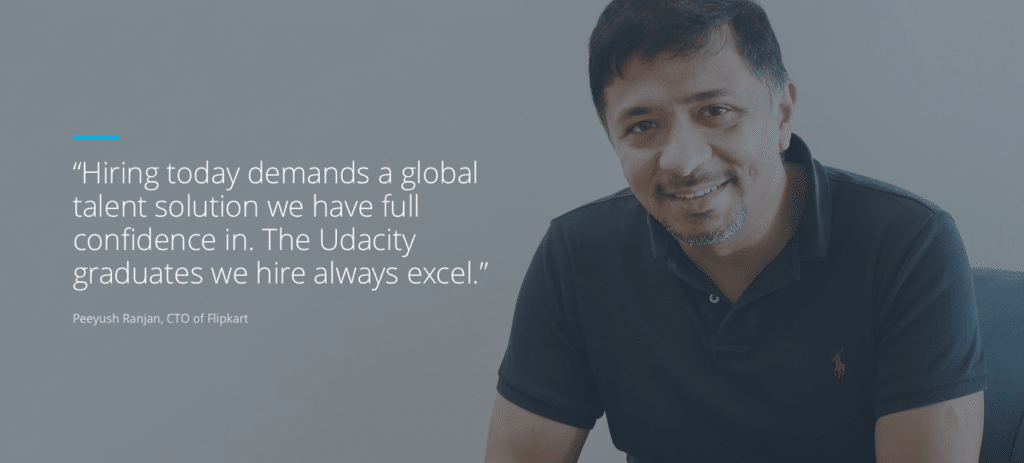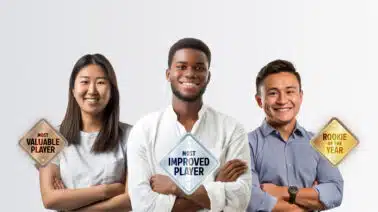Imagine the scene. After rounds and rounds of applications—plus all the analysis, filtering, and ranking—the hiring committee finally convenes. The stakes are high, the need is real, and decisions need to be made. A question is asked, “Which ones do we bring in for an interview?” A brief moment of silence follows, then another voice counters, “No. Which ones do we want to HIRE?”
This was a game-changing moment in the history of Flipkart, the company for which I am Chief Technology Officer. On that day, we elected to make critical hiring decisions based entirely on metadata contained in candidate profiles provided by Udacity. We wanted to try a radical idea: Hire the best talent with no interviews. Sound crazy? High risk? What about culture fit? Personality? Work ethic? Ability to collaborate? Team spirit?
Fast forward to today, and I can tell you the Udacity candidates we hired in January of 2016 are already in the topmost of Android Engineers at Flipkart. Conventional wisdom might consider Interviewless Hiring a high-risk experiment, but I think otherwise.
Interviewless Hiring, the way we’ve developed it with Udacity, is actually much less risky. The data can tell us what we need to know far more reliably than an in-person interview can. An interview is a once-in-a-lifetime interaction, fraught with too many irrelevant factors that can bias the experience one way or the other. Our approach with Udacity provides a long-term, holistic image of a candidate’s skills and behaviors. The proof is in the results. We hired candidates based on their Udacity profiles, and they’re excelling.
The concept of Interviewless Hiring emerged from a philosophy shared by myself and Sebastian Thrun, President and Co-founder of Udacity. Together, we knew that if a new kind of education was possible—and it was—then surely a new approach to hiring was possible as well.
“Every time a Udacity graduate gets a great job because of the skills they learned with us, I know we’ve done something really special to help change that person’s life. To have an amazing company like Flipkart partner with us on Interviewless Hiring, and to see our graduates perform so well in their new roles, gives us great confidence in our graduates, and in the future of learning.”
—Sebastian Thrun
Interviewless Hiring involves no compromise when it comes to process—as with any “traditional” hire, every step is executed with rigor and tenacity. The difference is the quality and depth of the information we review, and the confidence we have in that information.
What’s important to understand is that Udacity students learn by doing, so as they progress, they build up a portfolio of work. They also establish an ongoing record of their performance and behavior. They take tests, watch videos, and ask questions. They engage with mentors and coaches, and in forums and Slack communities. They post to GitHub, participate in hackathons, enter competitions, and publish apps. All of this activity produces data, which becomes part of the unique metadata contained in Udacity candidate profiles.
Soft skills are assessed by determining to what extent any given candidate is:
- Versatile
- Creative
- Self-motivated & Driven
- Independent
- Meticulous
- Receptive and responsive to feedback
- Patient
- Practical & Resourceful
These assessments are then bundled with items such as:
- Bio
- Resume
- Links to LinkedIn and GitHub profiles
- Links to relevant personal sites (websites, blogs, etc.)
- Project descriptions and results (including Capstone Project)
- Code review performance (if students have worked as code reviewers)
The final result is an in-depth, thorough, balanced, and detailed candidate profile, which is then put through the same rigorous, committee-based scrutiny that our classical interview feedback is subjected to.
Flipkart and Udacity are committed to Interviewless Hiring now and in the future, and we look forward to sharing more success stories like the one we’ve shared today. Risk has historically been accepted as a given when it comes to hiring, but I believe that this new approach stands to radically change hiring practices for the better, significantly lowering risk, and ultimately ensuring that companies hire not just the best talent, but the right talent.
It has certainly worked for Flipkart.




